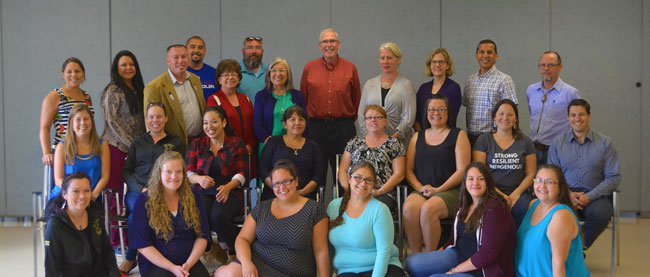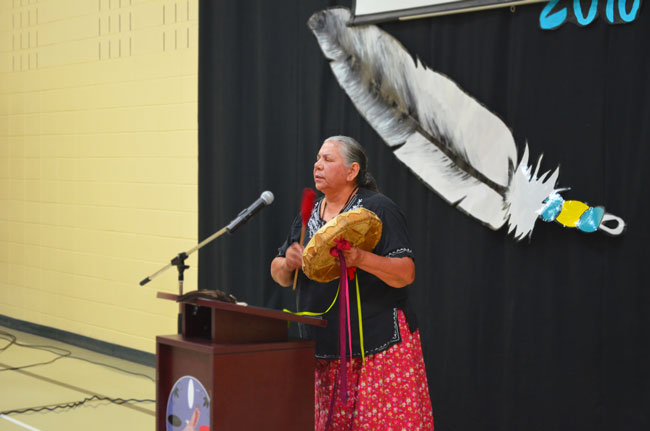
By James Martin
Trisha Caplin is a licensed practical nurse living and working in Gesgapegiag, a First Nations community on the south shore of the Gaspésie. She loves nursing, but it can be a 24/7 job. That’s not the best fit now that Caplin has an infant daughter, so a career change is in order. She wants to become a teacher. That means getting a Bachelor of Education, but the nearest universities are in Fredericton (approximately 450 kilometres away) and Saint John (closer to 550 kilometres) – too far to commute, and Caplin doesn’t want to move her young family away from their community.
This isn’t the right time for her to go to university – so the university has come to her.
Trisha Caplin is one of 20 students studying in McGill’s new Bachelor of Education First Nations Inuit Education (Kindergarten-Elementary) degree program. The innovative program is a McGill first: the students will do all their coursework in Listuguj, a First Nations community along the Quebec-New Brunswick border. The courses will be taught by instructors from Mi’gmaq Territory. In four years, the students will graduate with a B.Ed. degree from McGill – without ever having set foot on either of the University’s Montreal campuses.
“I was drawn to the program because for one, I have a family and was not willing to leave them behind,” says Caplin, who would like to become a teacher at Wejgwapeniag School in Gesgapegiag. “McGill is also an amazing school with a great reputation and I could not pass up the opportunity.”

Kristie Lavallee Methot and Tanya Wysote, both students in the program, were also attracted to the program’s in-community nature.
“I grew up in Montreal until the age of 18 and did not have a strong connection with my extended family,” says Methot, now 26 and the mother of three daughters all under the age of five. “I do not want my children to feel the same disconnection that I did with my family, language and culture. I am a strong believer in the importance of having extended family around my children, and to be a part of their life. Living here, my girls get to see their grandparents, great-grandparents, aunts, uncles and cousins on a daily basis.”
“The idea of moving has been a deterrent in furthering my studies,” says Wysote, who works as administrative assistant and home support worker for Families First Support Services in Listuguj. She completed a Bachelor of Arts in Community Studies offered by Cape Breton University, in Listuguj, but has never moved away for postsecondary education. “I was never comfortable in the idea of moving. My family is here and the strong connection I feel for my community has always given me the security I need. I do not mind visiting places but there’s no place like home.”
The McGill program launched on Aug. 29, 2016, with a celebration. More than 100 students and educators gathered in Listuguj for a day of prayer, keynote addresses and workshops. The festivities concluded with a rattle song performed by RoseAnn Martin, a traditional Mi’gmaw woman and elder from the community.
The students range in age from 22 to 56. Some are juggling work with their studies. Others, like Caplin and Methot, are raising families. Some have already earned degrees, while others are fresh to university. What they have in common, however, is they all live in either Listuguj, Gesgapegiag or Ugpi’Ganjig – all predominately Mi’gmaq communities located on the Bay of Chaleur. Together, the three communities are home to approximately 6,000 people.
Over the next four years, the students will take four four-week courses per semester, one at a time, plus two courses during the summer, for an annual total of 30 credits. There will also be four practicums, ranging in duration from 10 days to 13 weeks. The program is geared toward students with work or family commitments, so the thrice-weekly courses are held in the evenings.

This new program is a collaboration between McGill’s Faculty of Education and the Listuguj Department of Education. It began as a proposed 60-credit certificate, but there was great interest within the communities for being able to complete a full-on, 120-credit degree without having to move away. Although there have been a few other in-community degree programs on Canadian reserves – such as the Cape Breton University B.A. that Tanya Wysote completed – this is Canada’s first such Bachelor of Education program. Other B.Ed. programs are done completely on a campus, or half-campus and half-community; either way, students have traditionally been required to move.
“Coming to university is a huge move,” says Paige Isaac, the coordinator of the First Peoples’ House. A graduate of the Faculty of Science, she herself came to study at McGill from her home in Listuguj. “Moving away from your community and to a big city can be really, really tough.”
First Peoples’ House is largely focused on providing a culturally welcoming environment to Indigenous students who have made that move. Isaac is excited to see McGill expand Indigenous education options with this in-community degree program.
“I think it’s amazing that there’s this opportunity to bring it to the community and make getting a degree more accessible,” she says. “It’s a great initiative.”
The new B.Ed. is about more than just where the courses are delivered – the classes themselves are different.
The courses are being taught in the Mi’gmaq community, in the Mi’gmaq language, by Mi’gmaq instructors – and using Mi’gmaq knowledge and learning styles. There is smudging at the start of class, for example, and use of talking circles to facilitate complex and difficult discussions.
“Over the summer months, as part of its planning process, a body called the Council of Mi’gmaq Educators met to develop and put in place guidelines for the indigenizing of curricula,” says Listuguj Chief Darcy Gray. “Indigenizing the curricula is not about ‘adding in a few extra readings or textbooks’ to highlight Indigenous perspectives. Rather, the Council of Mi’gmaq Educators envisions Indigenization as part of a broader movement to ‘unsettle’ settler colonialism and foster healthier relations amongst Indigenous and non-Indigenous Canadians. The vision is to create a space in the community for students, teachers and administrators to learn, critique, to dream, to speak and to write about Indigenous and Western knowledge systems in a meaningful, healthy, and respectful manner.”
The courses in the new B.Ed. program reflect the traditional curriculum given on campus – e.g., the students will study philosophical foundations, reading education, classroom-based evaluations, children’s literature – while incorporating Indigenous knowledge perspectives along with Western knowledge.
“It’s different from the on-campus B.Ed. in that there’s more focus on the Indigenous cultures and Indigenous languages,” says Jim Howden, the director of McGill’s Office of First Nations and Inuit Education in the Faculty of Education. “This program is exciting not just because it’s accessible, but because it’s culturally relevant.” Howden has been working with the Listuguj Council of Mi’gmaq Educators to ensure “the B.Ed. given is of McGill’s standards and meets the needs of the Mi’gmaq Council of Educators. This is a McGill degree, infused with Mi’gmaq culture and values.” As the program rolls out, Howden will also be in continual contact with Melissa Drapeau, the post-secondary public relations liaison at the Listuguj Education, Training and Employment Department, “as much as possible in a face-to-face fashion to ensure that we at McGill are always in harmony with the needs of the students and the community.”
“The positive energy created by this, teaching your own people in your own backyard by your own people,” Chief Darcy Gray told the CBC, “it’s such a ripple effect that we saw through the Bachelor of Arts in community studies.” Gray was one of the instructors in the Cape Breton University program. “The cohort mentality that’s created where everybody’s there to support, everybody’s on the same page, and the goal is everybody be successful. So the ripple effect is tremendous.”
Tricia Caplin is already feeling it.
“We are just completing our first course, which is ‘Cultural Skills,’ and I have learned more about myself in the past month than I have known my whole life,” says Caplin, who grew up in Ugpi’Ganjig. Nine years ago, she moved away to attend university. She says it was a “great experience” but ultimately not for her. She stopped her studies after finishing her first year.
“I am enjoying this program much more,” she says. “The classes are more personal. We are all building a bond that will last a lifetime. When I was on campus [in 2007], we would sometimes – most times – have hundreds of other students in a lecture hall and it was intimidating. We could not ask questions without so many heads turning to look who was interrupting the class.”
Listuguj, Gesgapegiag and Ugpi’Ganjig have relatively young populations, with just over half being under the age of 30. The communities are trilingual, but the people most fluent in Mi’gmaq tend to be over 50. Caplin, who is 26 years old, is excited that her courses are being delivered in a mix of Mi’gmaq and English.
“I love how our culture is incorporated in our courses,” says Kristie Lavallee Methot, who attended high school and CEGEP in Montreal before moving back to her native Listuguj. After graduation, she would like to teach in Listuguj’s Alaqsite’w Gitpu School. “While living in Montreal, I never learned anything about my culture, language or Mi’gmaq values. I was actually ashamed of being Mi’gmaq while growing up in Montreal. I am slowly finding myself. Since I moved home, I have recognized that I have this passion in learning my language and culture. I want to be a part of the movement to bring back our language. I want to continue learning my language from my grandfather and pass on the language to my girls and, of course, other children in our community as well.”
“I’ve never taken the opportunity to learn about who I am as a Mi’gmaq person until now,” adds Caplan. “It’s made me more aware of who I am and I want to continue learning more outside of this course. I’ve started learning and now do not want to stop.”

I am so proud to be a part of history that we will graduate on 2020. I’m currently a Mi’gmaq Instructor at Sugarloaf Senior High School in Campbellton New Brunswick. The course is very interesting. Learning my history and my identity also.